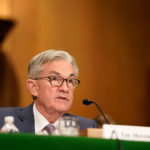
While assuring Americans that the fundamentals of the U.S. economy remain strong, the Fed cut its benchmark interest rate by one-half of a percentage point, to between 1 percent and 1.25 percent, two weeks ahead of its scheduled FOMC meeting. The “emergency” rate cut was prompted by the “evolving risks to economic activity due to the coronavirus.”
It was the Fed’s first emergency rate cut since 2008.
Fed Chair Jerome Powell attributed the central bank’s action to its need to respond to consumer sentiment and the impact the virus is having on the travel and tourism industries. The coronavirus requires action from the healthcare industry, and from fiscal and monetary policy makers, Powell said. “We realize a rate cut won’t lower infection rates or fix a broken supply chain,” he said, but the move should boost household and business confidence.
As of March 3, there have been 91,313 cases of coronavirus, with 3,118 deaths, worldwide. In the United States, there have been 105 confirmed cases and six deaths.
Asked if the Fed would reverse its decision if the virus was quickly contained, Powell was non-committal. President Trump had been calling for Powell to cut rates as late as March 2, tweeting: “Australia’s Central Bank cut interest rates and stated it will most likely further ease in order to make up for China’s Coronavirus situation and slowdown. They reduced to 0.5%, a record low. Other countries are doing the same thing, if not more so. Our Federal Reserve has us paying higher rates than many others, when we should be paying less. Tough on our exporters and puts the USA at a competitive disadvantage. Must be the other way around. Should ease and cut rate big. Jerome Powell led Federal Reserve has called it wrong from day one. Sad!”
Powell denied the move was political, saying: “What really matters is the risk to the economy, and we chose to act.”
Voting for the cut were Powell, John C. Williams, Michelle W. Bowman, Lael Brainard, Richard H. Clarida, Patrick Harker, Robert S. Kaplan, Neel Kashkari, Loretta J. Mester, and Randal K. Quarles.
